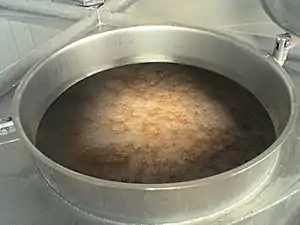Zymology
Zymology, also known as zymurgy (from the Greek: ζύμωσις+ἔργον, "the workings of fermentation") is an applied science which studies the biochemical process of fermentation and its practical uses. Common topics include the selection of fermenting yeast and bacteria species and their use in brewing, wine making, fermenting milk, and the making of other fermented foods.

Fermentation
Fermentation can be simply defined, in this context, as the conversion of sugar molecules into ethanol and carbon dioxide by yeast.
History
French chemist Louis Pasteur was the first zymologist when in 1857 he connected yeast to fermentation. Pasteur originally defined fermentation as respiration without air.
Pasteur performed careful research and concluded,
"I am of the opinion that alcoholic fermentation never occurs without simultaneous organization, development and multiplication of cells . . .. If asked, in what consists the chemical act whereby the sugar is decomposed . . . I am completely ignorant of it."
The German Eduard Buchner, winner of the 1907 Nobel Prize in chemistry, later determined that fermentation was actually caused by a yeast secretion, which he termed zymase.
The research efforts undertaken by the Danish Carlsberg scientists greatly accelerated understanding of yeast and brewing. The Carlsberg scientists are generally acknowledged as having jump-started the entire field of molecular biology.
Products
- All alcoholic drinks including beer, cider, kombucha, kvass, mead, perry, tibicos, wine, pulque, hard liquors (brandy, rum, vodka, sake, schnapps), and soured by-products including vinegar and alegar
- Yeast leavened breads including sourdough, salt-rising bread, and others
- Cheese and some dairy products including kefir and yogurt
- Chocolate
- Dishes including fermented fish, such as garum, surströmming, and Worcestershire sauce
- Some vegetables such as kimchi, some types of pickles (most are not fermented though), and sauerkraut
- A wide variety of fermented edibles made from soy beans, including fermented bean paste, nattō, tempeh, and soya sauce
External links
- Winemaking: Fundamentals of winemaking: zymology
- Life Sciences: List of life sciences